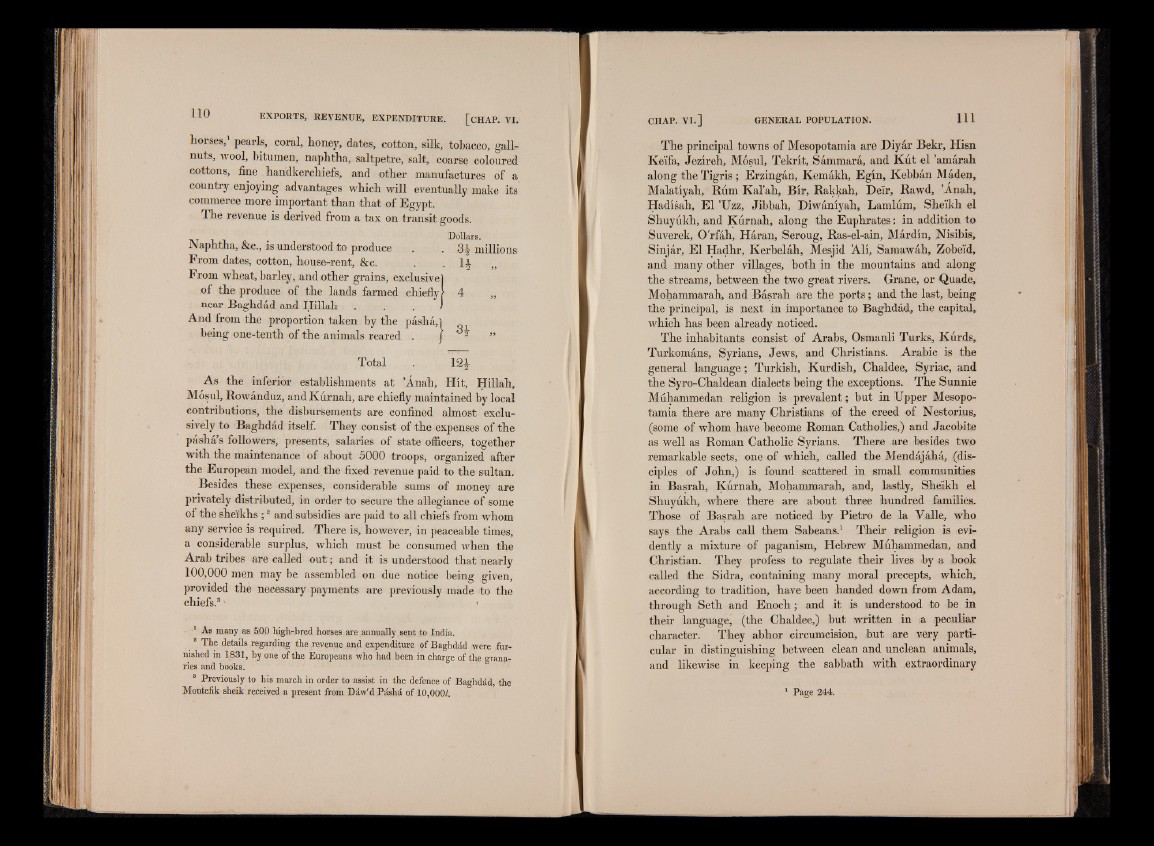
horses,1 pearls, coral, honey, dates, cotton, silk, tobacco, gall-
nuts, wool, bitumen, naphtha, saltpetre, salt, coarse coloured
cottons, fine handkerchiefs, and other manufactures of a
country enjoying advantages which will eventually make its
commerce more important than that of Egypt.
The revenue is derived from a tax on transit goods.
Iv a j Dollars.
J\ aphtha, &e., is understood to produce . . 3 | millions
From dates, cotton, house-rent, &c. . l j
From wheat, barley, and other grains, exclusive
of the produce of the lands farmed chiefly
near Baghdad and Hillah .
And from the proportion taken by the pasha,!
being one-tenth of the animals reared . J 5 ”
Total . 121
As the inferior establishments at ’Anah, Hit, Hillah,
Mosul, Rowanduz, and Kurnah, are chiefly maintained by local
contributions, the disbursements are confined almost exclusively
to Baghdad itself. They consist of the expenses of the
pasha s followers, presents, salaries of state officers, together
with the maintenance of about 50G0 troops, organized after
the European model, and the fixed revenue paid to the sultan.
Besides these expenses, considerable sums of money are
privately distributed, in order to secure the allegiance of some
of the sheikhs ;2 and subsidies are paid to all chiefs from whom
any service is required. There is, however, in peaceable times,
a considerable surplus, which must be consumed when the
Arab tribes are called out; and it is understood that nearly
100,000 men may be assembled on due notice being given,
provided the necessary payments are previously made to the
chiefs.3' •
1 As many as 500 high-bred horses are annually sent to India.
2 The details regarding the revenue and expenditure of Baghdad were furnished
in 1831, by one of the Europeans who had been in charge of the granaries
and books.
8 Previously to his march in order to assist in the defence of Baghddd, the
Montefik sheik received a present from Ddw'd Pashd of 10,0001.
The principal towns of Mesopotamia are Diyar Bekr, Hisn
Keifa, Jezireh, Mosul, Tekrit, Sammara, and Kut el ’amarah
along the Tigris ; Erzingan, Kemakh, Egin, Kebban Maden,
Malatiyah, Rum Kal’ah, Bir, Rakkah, Dear, Rawd, ’Anah,
Hadisah, El ’Uzz, Jibbah, Diwaniyah, Lamlum, Sheikh el
Shuyukh, and Kurnah, along the Euphrates; in addition to
Suverek, O'rfah, Haran, Seroug, Ras-el-ain, Mardin, Nisibis,
Sinjar, El Hadhr, Kerbelah, Mesjid Ali, Samawah, Zobeid,
and many other villages, both in the mountains and along
the streams, between the two great rivers. Grane, or Quade,
Mohammarah, and Basrah are the ports; and the last, being
the principal, is next in importance to Baghdad, the capital,
which has been already noticed.
The inhabitants consist of Arabs, Osmanli Turks, Kurds,
Turkomans, Syrians, Jews, and Christians. Arabic is the
general language; Turkish, Kurdish, Chaldee, Syriac, and
the Syro-Chaldean dialects being the exceptions. The Sunnie
Muhammedan religion is prevalent; but in Upper Mesopotamia
there are many Christians of the creed of Nestorius,
(some of whom have become Roman Catholics,) and Jacobite
as well as Roman Catholic Syrians. There are besides two
remarkable seets, one of which, called the Mendajaha, (disciples
of John,) is found scattered in small communities
in Basrah, Kurnah, Mohammarah, and, lastly, Sheikh el
Shuyukh, where there are about three hundred families.
Those of Basrah are noticed by Pietro de la Valle, who
says the Arabs call them Sabeans.1 Their religion is evidently
a mixture of paganism, Hebrew Muhammedan, and
Christian. They profess to regulate their lives by a book
called the Sidra, containing many moral precepts, which,
according to tradition, have been handed down from Adam,
through Seth and Enoch; and it is understood to be in
their language, (the Chaldee,) but written in a peculiar
character. They abhor circumcision, but are very particular
in distinguishing between clean and unclean animals,
and likewise in keeping the sabbath with extraordinary
1 Page 244.